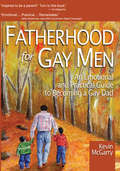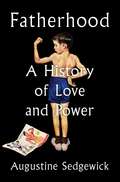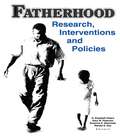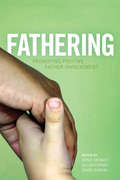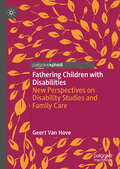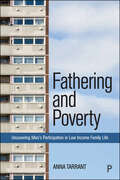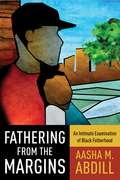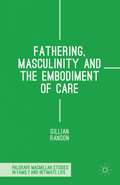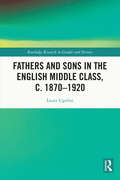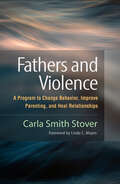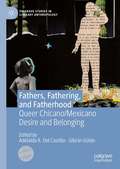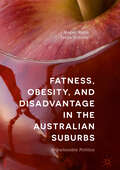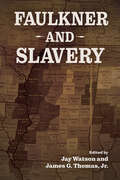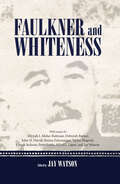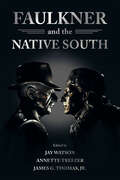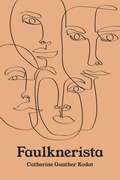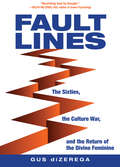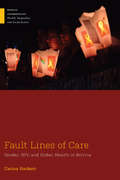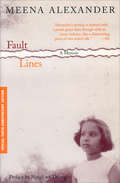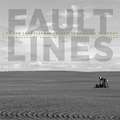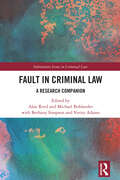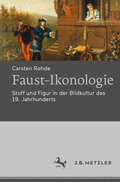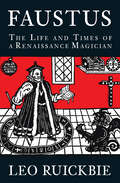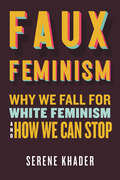- Table View
- List View
Fatherhood for Gay Men: An Emotional and Practical Guide to Becoming a Gay Dad (Race and Politics)
by Kevin McgarryGet the inside story on a single gay man's struggle to adopt! Fatherhood for Gay Men: An Emotional and Practical Guide to Becoming a Gay Dad is the story of one man's journey down the road less traveled-a single gay man adopting and raising his two sons. Author Kevin McGarry recounts his passage into parenthood after years of having his natural fathering instincts stifled by the limits-real and perceived-of being gay. This unique book details the emotional, financial, practical, and social realities of the adoption process for gay men. From the author: "We take risks by coming out of the closet as gay men and at the end of the day, we are emotionally happier because we took those risks. By coming out, we are being true to who we are. The same goes for anyone, gay or straight, who has gut instincts for parenthood. I knew over the years that I had parenting instincts because I had this incredible envy of other dads. I would watch them with their kids and wish that somehow, I could have that role. It was painful at times because being gay, I didn't think parenting was in my life plan. Had more role models been available to me, the process would have been a little less difficult." Much more than a "how-to" guide to adoption, Fatherhood for Gay Men is the personal account of a single gay man's struggle to become a father despite the real and imagined limitations of being a gay man. The book looks at the adoption process (domestic and international) from the inside, providing unique insight into: conducting a homestudy costs (fees and expenses) what countries allow men to adopt alternatives to adoption life as a new parent online resources and a state-by-state review of adoption laws, categorized by "Completely Legal," "Favorable Climate," "Mixed Success," and "Illegal" The book also includes results of the 2000 study by Gillian Dunne, senior researcher for the London School of Economics Gender Institute, of 100 gay fathers and fathers-to-be. "Fatherhood for Gay Men: An Emotional and Practical Guide to Becoming a Gay Dad is a heartfelt and heartwarming story of a father's refusal to be denied a family.Visit the Author's Web site at http://www.fatherhoodforgaymen.com
Fatherhood: A History of Love and Power
by Augustine Sedgewick&“Superbly intelligent…[a] rewarding Sapiens-style big history.&” —The Times (London) A bold and original history of fatherhood, exploring its invention and transformation from the Bronze Age to the present through a collective portrait of emblematic fathers who have helped to define how the world should be ruled and what it means to be a man.Fatherhood is one of the most meaningful aspects of human culture, but we know little about when or where fatherhood first emerged, or even how or why. Despite its enigmatic beginnings, fatherhood has, for centuries, given shape to ideas about the world, defined human experiences, and provided the foundation of patriarchy. The history of fatherhood is not just the story of one of humanity&’s great values: caring for those who cannot care for themselves. And it is not merely the story of patriarchy—&“the power of fathers&”—which is arguably the oldest and most widespread form of social hierarchy and political oppression. It is the story of how these twin strands of history became so entangled that they are often indistinguishable. In Fatherhood, celebrated historian Augustine Sedgewick explains how this style of parenting emerged in the first place, why it has changed over time, and whether it will endure as we know it, despite its extraordinary costs. Told through the lives of emblematic fathers like Aristotle, Saint Augustine, Henry VIII, Thomas Jefferson, Charles Darwin, and Sigmund Freud, this is an ambitious yet intimate look at how masculinity has evolved and how men have come to hold disproportionate power by expanding and reinforcing the power of fathers in times of crisis. Sedgewick, acclaimed for his &“literary gifts and prodigious research&” (The Atlantic), takes us from the Bronze Age to the present to revolutionize our understanding of fathers and challenge the fictions that have surrounded them for centuries. Fatherhood transforms our understanding of this fundamental idea, experience, and institution, allowing us to better know our past and re-envision our common future.
Fatherhood: Research, Interventions, and Policies
by H. Elizabeth Peters Gary W Peterson Suzanne Steinmetz Randal D DayHow much power does a father have to influence his children's development? A lively and often heated public debate on the role and value of the father in a family has been underway in the United States for the past decade. Nevertheless, we are far from understanding the complex ways in which fathers make contributions to their families and children. Fatherhood: Research, Interventions, and Policies addresses the central questions of the role of fathers: What is the impact of father involvement on child outcomes? What factors predict increased involvement of fathers?Bringing together papers presented at the Conference on Father Involvement, this volume includes contributions by leading scholars in anthropology, demography, economics, family science, psychology, and sociology. Many of the contributors also address the implications of father involvement for family policy issues, including family leave, child care, and child support. Furthermore, the discussion of fatherhood ranges well beyond the case of intact, middle-class, white families to include fathers from various ethnic groups and socioeconomic classes and of varied marital status, including fathers of nonmarital children, single-father families, and nonresident fathers. Fatherhood: Research, Interventions, and Policies addresses both practical and theoretical concerns, including:the redefinition of fatherhood changes over time in research on fatherhood the predictive power of fathers’activities on their children's adult outcomes the correlation between fathers’income and their involvement with their nonmarital children the influence of fathers on their sons’probability of growing up to become responsible fathers the effects of divorce on father-son and father-daughter relationships interventions that help to keep divorced fathers in touch with their childrenThis comprehensive, powerful book combines pioneering empirical research with thoughtful consideration of the social and psychological implications of fatherhood. It is essential reading for researchers, policymakers, psychologists, and students of family studies, human development, gender studies, social policy, sociology, and human ecology.
Fathering
by Annie Devault Gilles Forget Diane DubeauIn the past few decades, researchers and practitioners have moved away from the idea of fatherhood as a single, monolithic concept. Examining the challenges of vulnerable fathers such as those in poverty or in prison, they have developed valuable new strategies for cultivating the positive involvement of fathers in the lives of their children.Drawing on the innovative work of Prospère, a Quebec organization that brought together fathers, university researchers, and health and social service practitioners, Fathering details innovative approaches that support positive father involvement. It provides numerous examples of strategies and interventions with fathers, lessons learned from these practices on how to better support vulnerable fathers and families, and in-depth information on ways of designing, implementing, evaluating, and disseminating the results of participatory action research (PAR) - a methodology which put fathers at the heart of the project's decision-making.
Fathering Children with Disabilities: New Perspectives on Disability Studies and Family Care
by Geert Van HoveThis book explores the often-forgotten role of fathers of children with disabilities. Bridging the gap between disability studies, family studies, and gender studies, it uncovers men's perspective on caring for children with disabilities and presents examples of famous fathers, such as general Charles de Gaulle, film director Dan Habib, and scholars Michael Bérubé and Phil Ferguson. Drawing on interviews with fathers of children with disabilities, the author explores what makes a father a 'good father' and presents fatherhood as an intense and dynamic journey of discovery, experienced together with the children, as a process of ‘becoming with’. The testimonies offer an insight into the lived experience of fathers and challenge the model of caring masculinity through a narrative approach, with the aim to answer burning questions: can we built research lines around the experiences of fathers? can we secure the father perspective within family research and within support services for families with children with disabilities? A must read for academics in social science, education, and medical fields.
Fathering and Poverty: Uncovering Men’s Participation in Low-Income Family Life
by Anna TarrantAnna Tarrant’s revealing research explores the dynamics of men’s caring responsibilities in low-income families’ lives. The book draws on pioneering multigenerational research to examine men’s involvement in care for their families. It interrogates how this is affected by the resources available and the constraints upon them, considering intersections of gender, generation and work, as well as the impact of austerity and welfare support. Illuminating aspects of care within economic hardship that often go unseen, it deepens our understanding of masculinities and family life and the policies and practices that support or undermine men’s participation.
Fathering from the Margins: An Intimate Examination of Black Fatherhood
by Aasha M. AbdillDespite a decade of sociological research documenting black fathers’ significant level of engagement with their children, stereotypes of black men as “deadbeat dads” still shape popular perceptions and scholarly discourse. In Fathering from the Margins, sociologist Aasha M. Abdill draws on four years of fieldwork in low-income, predominantly black Bedford-Stuyvesant, Brooklyn, to dispel these destructive assumptions. She considers the obstacles faced—and the strategies used—by black men with children.Abdill presents qualitative and quantitative evidence that confirms the increasing presence of black fathers in their communities, arguing that changing social norms about gender roles in black families have shifted fathering behaviors. Black men in communities such as Bed-Stuy still face social and structural disadvantages, including disproportionate unemployment and incarceration, with significant implications for family life. Against this backdrop, black fathers attempt to reconcile contradictory beliefs about what makes one a good father and what makes one a respected man by developing different strategies for expressing affection and providing parental support. Black men’s involvement with their children is affected by the attitudes of their peers, the media, and especially the women of their families and communities: from the grandmothers who often become gatekeepers to involvement in a child’s life to the female-dominated sectors of childcare, primary school, and family-service provision. Abdill shows how supporting black men in their quest to be—and be seen as—family men is the key to securing not only their children's well-being but also their own.
Fathering, Masculinity and the Embodiment of Care (Palgrave Macmillan Studies in Family and Intimate Life)
by Gillian RansonMany fathers are now providing hands-on, engaged care to babies and young children. This book draws on observations of, and interviews with, caregiving fathers, as well as analyses of fathers' memoirs and online blogs, to examine fathers' caregiving work as embodied practice and as lived experience.
Fathers and Sons in the English Middle Class, c. 1870–1920 (Routledge Research in Gender and History #43)
by Laura UgoliniThis book explores the relationship between middle-class fathers and sons in England between c. 1870 and 1920. We now know that the conventional image of the middle-class paterfamilias of this period as cold and authoritarian is too simplistic, but there is still much to be discovered about relationships in middle-class families. Paying especial attention to gender and masculinities, this book focuses on the interactions between fathers and sons, exploring how relationships developed and masculine identities were negotiated from infancy and childhood to adulthood and old age. Drawing on sources as diverse as autobiographies, oral history interviews, First World War conscription records and press reports of violent incidents, this book questions how fathers and sons negotiated relationships marked by shifting relations of power, as well as by different combinations of emotional entanglements, obligations and ties. It explores changes as fathers and sons grew older and assesses fathers’ role in trying to mould sons’ masculine identities, characters and lives. It reveals negotiation and compromise, as well as rebellion and conflict, underlining that fathers and sons were important to each other, their relationships a significant – if often overlooked – aspect of middle-class men’s lives and identities.
Fathers and Violence: A Program to Change Behavior, Improve Parenting, and Heal Relationships
by Carla Smith StoverThis highly accessible book presents a new approach to treating men who use violence against their partners and/or children. The Fathers for Change (F4C) program has a unique focus on fostering fathers' accountability and reflective functioning, and repairing father–child relationships. Grounded in theory and research, it addresses a key need for parents who want to stay together or coparent successfully in the aftermath of violence, while prioritizing all family members' safety. Clinicians learn how to implement each component of F4C, from assessment to individual-focused work to coparent and family sessions, if appropriate. Illustrative case vignettes are featured throughout. An appendix provides 32 reproducible forms, worksheets, and handouts that can be downloaded (many in a fillable format) and printed as needed.
Fathers, Fathering, and Fatherhood: Queer Chicano/Mexicano Desire and Belonging (Palgrave Studies in Literary Anthropology)
by Adelaida R. Del Castillo Gibrán GüidoBringing together a unique collection of narrative accounts based on the lived experience of queer Chicano/Mexicano sons, this book explores fathers, fathering, and fatherhood. In many ways, the contributors reveal the significance of fathering and representations of fatherhood in the context of queer male sexuality and identity across generations, cultures, class, and Mexican immigrant and Mexican American families. They further reveal how father figures—godfathers, grandfathers, and others—may nurture and express love and hope for the queer young men in their extended family. Divided into six sections, the book addresses the complexity of father-queer son relationships; family dynamics; the impact of neurodiverse mental health issues; the erotic, unsafe, and taboo qualities of desire; encounters with absent, estranged or emotionally distant fathers; and a critical analysis of father and queer son relationships in Chicano/Latino literature and film.
Fatness, Obesity, and Disadvantage in the Australian Suburbs: Unpalatable Politics
by Megan Warin Tanya ZivkovicThis ethnography takes the reader into the Australian suburbs to learn about food, eating and bodies during the highly political context of one of Australia’s largest childhood obesity interventions. While there is ample evidence about the number of people who are overweight or obese and an abundance of information about what and how to eat, obesity remains ‘a problem’ in high-income countries such as Australia. Rather than rely on common assumptions that people are making all the wrong choices, this volume reveals the challenges of ‘eating healthy’ when money is scarce and how, different versions of being fat and doing fat happen in everyday worlds of precarity. Without acknowledgement of the multiple realities of fatness and obesity, interventions will continue to have limited reach.
Faulkner and Slavery (Faulkner and Yoknapatawpha Series)
by Jay Watson and James G. ThomasContributions by Tim Armstrong, Edward A. Chappell, W. Ralph Eubanks, Amy A. Foley, Michael Gorra, Sherita L. Johnson, Andrew B. Leiter, John T. Matthews, Julie Beth Napolin, Erin Penner, Stephanie Rountree, Julia Stern, Jay Watson, and Randall WilhelmIn 1930, the same year he moved into Rowan Oak, a slave-built former plantation home in his hometown of Oxford, Mississippi, William Faulkner published his first work of fiction that gave serious attention to the experience and perspective of an enslaved individual. For the next two decades, Faulkner repeatedly returned to the theme of slavery and to the figures of enslaved people in his fiction, probing the racial, economic, and political contours of his region, nation, and hemisphere in work such as The Sound and the Fury; Light in August; Absalom, Absalom!; and Go Down, Moses.Faulkner and Slavery is the first collection to address the myriad legacies of African chattel slavery in the writings and personal history of one of the twentieth century’s most incisive authors on US slavery and the long ordeal of race in the Americas. Contributors to the volume examine the constitutive links among slavery, capitalism, and modernity across Faulkner’s oeuvre. They study how the history of slavery at the University of Mississippi informs writings like Absalom, Absalom! and trace how slavery’s topologies of the rectilinear grid or square run up against the more reparative geography of the oval in Faulkner’s narratives. Contributors explore how the legacies of slavery literally sound and resound across centuries of history, and across multiple novels and stories in Faulkner’s fictional county of Yoknapatawpha, and they reveal how the author’s remodeling work on his own residence brought him into an uncomfortable engagement with the spatial and architectural legacies of chattel slavery in north Mississippi. Faulkner and Slavery offers a timely intervention not only in the critical study of the writer’s work but in ongoing national and global conversations about the afterlives of slavery and the necessary work of antiracism.
Faulkner and Whiteness
by Jay WatsonWilliam Faulkner wrote during a tumultuous period in southern racial consciousness, between the years of the enactment of Jim Crow and the beginnings of the civil rights movement in the South. Throughout the writer's career, racial paradigms were in flux, and these shifting notions are reflected in Faulkner's prose. Faulkner's fiction contains frequent questions about the ways in which white Americans view themselves with regard to race along with challenges to the racial codes and standards of the region, and complex portrayals of the interactions between blacks and whites. Throughout his work, Faulkner contests white identity—its performance by whites and those passing for white, its role in shaping the South, and its assumption of normative identity in opposition to non-white “Others.” This is true even in novels without a strong visible African American presence, such as As I Lay Dying, The Hamlet, The Town, and The Mansion. Faulkner and Whiteness explores the ways in which Faulkner's fiction addresses and destabilizes the concept of whiteness in American culture. Collectively, the essays argue that whiteness, as part of the Nobel Laureate's consistent querying of racial dynamics, is a central element. This anthology places Faulkner's oeuvre—and scholarly views of it—in the contexts of its contemporary literature and academic trends exploring race and texts.
Faulkner and the Native South (Faulkner and Yoknapatawpha Series)
by Jay Watson, Annette Trefzer and James G. ThomasContributions by Eric Gary Anderson, Melanie R. Anderson, Jodi A. Byrd, Gina Caison, Robbie Ethridge, Patricia Galloway, LeAnne Howe, John Wharton Lowe, Katherine M. B. Osburn, Melanie Benson Taylor, Annette Trefzer, and Jay Watson From new insights into the Chickasaw sources and far-reaching implications of Faulkner’s fictional place-name “Yoknapatawpha,” to discussions that reveal the potential for indigenous land-, family-, and story-based methodologies to deepen understanding of Faulkner’s fiction (including but not limited to the novels and stories he devoted explicitly to Native American topics), the eleven essays of this volume advance the critical analysis of Faulkner’s Native South and the Native South’s Faulkner. Critics push beyond assessments of the historical accuracy of his Native representations and the colonial hybridity of his Indian characters. Essayists turn instead to indigenous intellectual culture for new models, problems, and questions to bring to Faulkner studies. Along the way, readers are treated to illuminating comparisons between Faulkner’s writings and the work of a number of Native American authors, filmmakers, tribal leaders, and historical figures. Faulkner and the Native South brings together Native and non-Native scholars in a stimulating and often surprising critical dialogue about the indigenous wellsprings of Faulkner’s creative energies and about Faulkner’s own complicated presence in Native American literary history.
Faulknerista
by Catherine G. KodatFaulknerista collects more than twenty years of critically influential scholarship by Catherine Gunther Kodat on the writings of one of the most important American authors of the twentieth century, William Faulkner. Initially composed as freestanding essays and now updated and revised, the book’s nine chapters place Faulkner’s work in the context of current debates concerning the politics of white authors who write about race, queer sexualities, and the use of the N-word in literature and popular culture. The Faulknerista of the title is a critic who tackles these debates without fear or favor, balancing admiration with skepticism in a manner that establishes a new model for single-author scholarship that is both historically grounded (for women have been writing about Faulkner, and talking back to him, since the beginning of his career) and urgently contemporary. Beginning with an introduction that argues for the critical importance of women’s engagement with Faulkner’s fiction, through comparative discussions pairing it with works by Toni Morrison, Jean-Luc Godard, Quentin Tarantino, and David Simon, Faulknerista offers a valuable resource for students, scholars, and general readers, written in an accessible style and aimed at stimulating discussions of Faulkner’s work and the rich interpretive challenges it continues to present.
Fault Lines
by Gus DizeregaThe United States is suffering its greatest upheaval since the Civil War-politically, economically, socially, religiously. With elegant, sweeping vision, Gus diZerega explores the complex causes leading us to this point, comparing them to giant fault lines that, when they erupt, create enormous disturbance and in time new landscapes. He traces the disruption, first, to America's first countercultural movement originating in the antebellum South and coming into later conflict with the "counterculture" of the 60s that continues now in phenomena like Burning Man; and second, to the crumbling of the moral foundation birthed by the Enlightenment, leading to today's nihilism. But within the loss resides hope: diZerega sees promise of a new society based more in equality, sacred feminine values, and spiritual immanence. Whether the prevailing oligarchy will abort this transformation is the question of our time. This book enables those of us now living through it to understand the powerful forces shaping our lives and calling on us for a response.
Fault Lines
by Gus DizeregaThe United States is suffering its greatest upheaval since the Civil War--politically, economically, socially, religiously. With elegant, sweeping vision, Gus diZerega explores the complex causes leading us to this point, comparing them to giant fault lines that, when they erupt, create enormous disturbance and in time new landscapes. He traces the disruption, first, to America's first countercultural movement originating in the antebellum South and coming into later conflict with the "counterculture" of the 60s that continues now in phenomena like Burning Man; and second, to the crumbling of the moral foundation birthed by the Enlightenment, leading to today's nihilism. But within the loss resides hope: diZerega sees promise of a new society based more in equality, sacred feminine values, and spiritual immanence. Whether the prevailing oligarchy will abort this transformation is the question of our time. This book enables those of us now living through it to understand the powerful forces shaping our lives and calling on us for a response.
Fault Lines of Care: Gender, HIV, and Global Health in Bolivia (Medical Anthropology)
by Carina HeckertThe HIV epidemic in Bolivia has received little attention on a global scale in light of the country’s low HIV prevalence rate. However, by profiling the largest city in this land-locked Latin American country, Carina Heckert shows how global health-funded HIV care programs at times clash with local realities, which can have catastrophic effects for people living with HIV who must rely on global health resources to survive. These ethnographic insights, as a result, can be applied to AIDS programs across the globe. In Fault Lines of Care, Heckert provides a detailed examination of the effects of global health and governmental policy decisions on the everyday lives of people living with HIV in Santa Cruz. She focuses on the gendered dynamics that play a role in the development and implementation of HIV care programs and shows how decisions made from above impact what happens on the ground.
Fault Lines: A Memoir (The\cross-cultural Memoir Ser.)
by Meena AlexanderPassionate, fierce, and lyrical, Meena Alexander's memoir traces her evolution as a postcolonial writer from a privileged childhood in India to a turbulent adolescence in the Sudan and then to England and New York City. In this tenth-anniversary edition of Fault Lines, this Alexander challenges the assumptions of life as a South Asian American woman writer in a post-9-11 world. With poetic insight and an honesty that will galvanize readers--both familiar and new--Alexander reveals her difficult recovery from a long-buried childhood trauma that revolutionizes the entire landscape of her memory: of her family, of her writing process and the meaning of memoir, and of her very self, now and before.Meena Alexander is a poet and professor of English and creative writing at Hunter College and the City University of New York.
Fault Lines: Life and Landscape in Saskatchewan's Oil Economy
by Emily Eaton Valerie ZinkOil is not new to Saskatchewan. Many of the wells found on farmland across the province date back to the 1950s when the industry began to spread. But there is little doubt that the recent boom (2006–2014) and subsequent downturn in unconventional oil production has reshaped rural lives and landscapes. While many small towns were suffering from depopulation and decline, others reoriented themselves around a booming oil industry. In place of the abandoned houses and shuttered shops found in many small towns in Saskatchewan, housing developments sprang up with new trucks and boats parked in driveways. Yet people in oil-producing areas also lived amid flare stacks that made them ill, had trouble finding housing due to vacancy rates that were among the lowest in the country, suffered through family breakdown because of long working hours and time spent away from home, and endured spills and leaks that contaminated their land. In the summer of 2014, at the height of the boom, geographer Emily Eaton and photographer Valerie Zink travelled to oil towns across the province, from the sea-can motel built from shipping containers on the outskirts of Estevan to seismic testing sites on Thunderchild First Nation’s Sundance grounds.
Fault in Criminal Law: A Research Companion (Substantive Issues in Criminal Law)
by Alan Reed Michael Bohlander Verity Adams Bethany SimpsonThis volume presents a comparative examination of the issue of fault in criminal law. Extant law reveals significant problems in adoption of consistent approaches to doctrinal and theoretical underpinnings of fault liability and culpability thresholds in criminal law. This has been exemplified by a plethora of recent jurisprudential authorities revealing varying degrees of confusion and vacillation. This collection focuses on fault liability for inculpation with contributions from leading specialists from different jurisdictions presenting alternative perspectives. The book addresses three specific elements within the arena of fault, embracing an overarching synergy between them. This structure facilitates an examination of UK provisions, with specialist contributions on domestic law, and in contrasting these provisions against alternative domestic jurisdictions as well as comparative contributions addressing a particularised research grid for content. The comparative chapters provide a wider background of how other legal systems treat a variety of specialised issues relating to fault elements in the context of the criminal law. With contributions from leading experts in the field, the book will be an invaluable resource for researchers, academics, and practitioners working in this area.
Faust-Ikonologie: Stoff und Figur in der Bildkultur des 19. Jahrhunderts
by Carsten RohdeDie Geschichte des Faust-Stoffes seit Goethe ist lange Zeit vor allem unter ideologischen Gesichtspunkten gedeutet worden. Die vorliegende Studie untersucht erstmals tiefergehend die populärkulturellen Resonanzen von Faust in der sich formierenden Medienmoderne des 19. Jahrhunderts. Die ‚Explosion der Bilder‘ sorgt dafür, dass Stoff und Figur in einer nie dagewesenen Vielfalt und Breite als visuelles Phänomen in Erscheinung treten. Faust wird zu einer populären Projektions- und Identifikationsfigur, die mit ganz unterschiedlichen Formen, Funktionen und Kontexten in Verbindung steht. Ihre Omnipräsenz in der Bildkultur des Jahrhunderts ist sowohl Spiegel als auch Katalysator dieser Entwicklungen.
Faustus: The Life and Times of a Renaissance Magician
by Leo RuickbieFive hundred years ago the legend was born of a man who sold his soul to the Devil for power, wealth and women. It is a legend that has inspired genius and still inspires high art and popular culture alike. Around the world there are hundreds of nightly performances of Geothe's Faust, as well as actual attempts at soul-selling on eBay. Faustus has rightly been described as an 'icon of modern culture'. But in 500 years no one has written his biography - until now. 'Faustus' is the real story behind the legend. It is the story of a sixteenth-century scandal, of a man who claimed mastery of the forbidden magical arts and dared to rival the miracles attributed to Jesus. he evoked uproar and was accused of heinous crimes. But Faustus was not a charlatan; nor was he in league with the Devil. To find the real Faustus is to find the true history of his age, and Leo Ruickbe expertly takes the reader on a tour of war-torn Italy, Reformation Wittenberg and the magnificence of Charles V's court. The life of the legend becomes as real as any living person.
Faux Feminism: Why We Fall for White Feminism and How We Can Stop
by Serene KhaderFor readers of Hood Feminism and Against White FeminismAn incisive examination of why the pillars of feminism have eroded—and how all women, not just the #girlbosses, can rebuild themAfter over 175 years, the feminist movement, now in its fourth wave, is at risk of collapsing on its eroding foundation. In Faux Feminism, political philosopher Serene Khader advocates for another feminism—one that doesn&’t overwhelmingly serve white, affluent #girlbosses. With empathy, passion, and wit, Khader invites the reader to join her as she excavates the movement&’s history and draws a blueprint for a more inclusive and resilient future.A feminist myth buster, Khader begins by deconstructing &“faux feminisms.&” Thought to be the pillars of good feminism, they may appeal to many but, in truth, leave most women behind. Khader identifies these traps that white feminism lays for us all, asking readers to think critically about –The Freedom Myth: The overarching misconception that feminism is about personal freedom rather than collective equality–The Individualism Myth: The pervasive idea that feminism aims to free individual women from social expectations–The Culture Myth: The harmful misconception that &“other&” cultures restrict women&’s liberation–The Restriction Myth: The flawed belief that feminism is a fight against social restrictions–The Judgment Myth: The fallacy of celebrating women&’s choices without first interrogating the privileges afforded or denied to the womenIn later chapters, Khader draws on global and intersectional feminist lessons of the past and present to imagine feminism&’s future. She pays particular attention to women of color, especially those in the Global South. Khader recounts their cultural and political stories of building a more inclusive framework in their societies. These are the women, she argues, from whom today&’s feminists can learn.Khader&’s critical inquiry begets a new vision of feminism: one that tackles inequality at the societal, not individual, level and is ultimately rooted in community.
